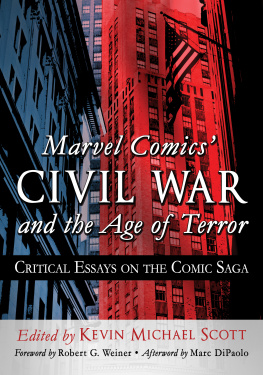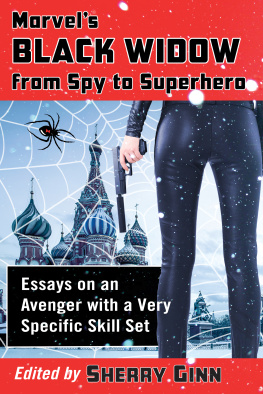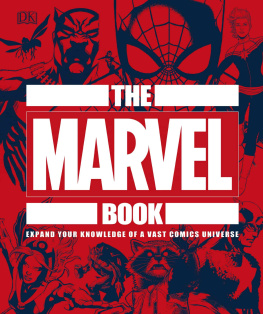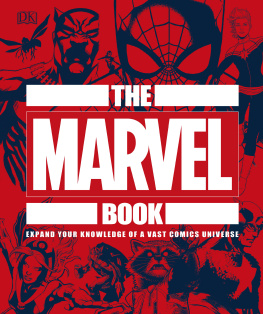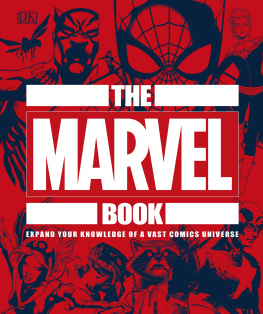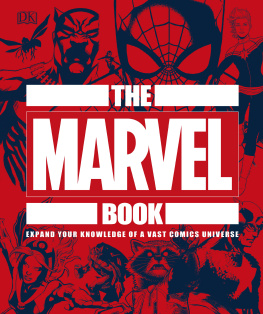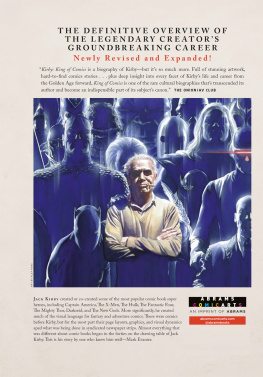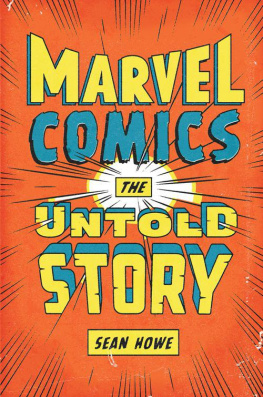
Marvel Comics Civil War and the Age of Terror
Critical Essays on the Comic Saga
Edited by Kevin Michael Scott
Foreword by Robert G. Weiner
Afterword by Marc DiPaolo

McFarland & Company, Inc., Publishers
Jefferson, North Carolina
LIBRARY OF CONGRESS CATALOGUING DATA ARE AVAILABLE
BRITISH LIBRARY CATALOGUING DATA ARE AVAILABLE
e-ISBN: 978-1-4766-2218-7
2015 Kevin Michael Scott. All rights reserved
No part of this book may be reproduced or transmitted in any form or by any means, electronic or mechanical, including photocopying or recording, or by any information storage and retrieval system, without permission in writing from the publisher.
Front cover image of an American flag on a building in New York City 2015 Jupiterimages/Photos.com/Thinkstock
McFarland & Company, Inc., Publishers
Box 611, Jefferson, North Carolina 28640
www.mcfarlandpub.com
To Bob, Marc and, of course, Mike.
You would look great in capes.
Acknowledgments
Gratitude, first, to Margaret Ellen Scott, whose discovered love for comics brought me back. Without you, this book would not exist. No exaggeration.
Special thanks:
To Robert Paul Lamb and Mary Ann Scott, whose readings made this a stronger, wiser book.
To John Lent, the editor-in-chief of the International Journal of Comic Art, for generously allowing me to include in this volume the excellent essay by Travis Langley.
To the contributors to this volume, who showed unflagging willingness to craft, edit, and refine their work. The book improved with every email I received. To Tony and Marc I owe extra thanks for the thoughtfulness and intensity of their ideas and support.
To the library staff at Albany State University for all of their support. No resource escapes their gaze.
And to Rob Weiner, whose conversations and mentorship both intimidated me and made the project feel like something I could actually accomplish.
Key to Abbreviations
AF Alpha Flight
ASM Amazing Spider-Man
ATA Avengers: The Initiative
CA Captain America
CW Civil War
CWCS Civil War: Choosing Sides
CWFL Civil War: Front Line
CWSB Civil War: Script Book
CWTC Civil War: The Confession
CWTI Civil War: The Initiative
CWYAR Civil War: Young Avengers & Runaways
DA Dark Avengers
IIM The Invincible Iron Man
MM Ms. Marvel
NA The New Avengers
NAI New Avengers: Illuminati
SHRA Superhuman Registration Act
SI Secret Invasion
TB Thunderbolts
UX Uncanny X-Men
Foreword
Robert G. Weiner
Secrecy, being an instrument of conspiracy, ought never to be the system of a regular government.Jeremy Bentham
Real liberty is neither found in despotism or the extremes of democracy, but in moderate governments.Alexander Hamilton
There are those events in the history of comics that are significant and then there are those comics events that are really important (that deserve the emphasis). These are events that are worth talking about years (even decades) after they are published. I am talking about stories that continue to have relevance both for the writers and artists who create the comics, as well as for the fans who read and enjoy them and the scholars who study them. Ask the fanboys (and, increasingly, fangirls) what some of the major crossover events are in the history of mainstream superhero comics and youd most likely get the standard responses: Avengers: Kree Skrull War, Spider-Man: Death of Gwen Stacey, Clone-Saga, Batman: Knightfall, Death in the Family, Death of Superman, Fantastic Four: The Galactus Trilogy, Crisis on Infinite Earths, Fourth World Saga, X-Men: Dark Phoenix Saga, and Legion of Superheroes: The Great Darkness Saga are just a few of the stories that might be mentioned in passing. Civil War, published in 2006 and 2007 by Marvel Comics, would also be among those. It encompasses nearly 200 individual comics and culminates in the death of Captain America.
While I have always argued that comics are a form of social history and can be viewed as primary historical documents, Civil War has a special kind of resonance. It is one of those comic book sagas that is certainly a reflection of its time, but it also has a timeless quality to it that will speak to generations twenty, fifty, a hundred years after it began publication (2006). Sure, one can see the series as a response to the concerns raised by the events of September 11, 2001, the USA PATRIOT Act, and the rise of modern-day terrorism. Certainly one can also see the parallels between the Negative Zone prison and Guantanamo Bay detention camp. However, the social and cultural resonance of the comic event goes much deeper than that because, at its core, Civil War is about the struggle between the Common Good and the Right to individual liberty and privacy.
With so much concern today over Big Brother in the form of the NSA and government spying on individual citizens and ones right to privacy, Civil War is more timely than ever. As long as we live in a world where identity theft and ease of access to ones personal information continues to be an ever-present issue, Civil War will continue to be a story that readers will go back to time and time again and scholars will find new points of analysis and relevance.
Readers and commentators have often seen Captain America and his team as the heroes of the story standing up for personal liberty and the rights of the individual. It is all too easy to vilify Iron Man and his team as the evil establishment group who are trying to force everyone else to conform to some unreasonable standard. We have to remember, though, that Iron Man truly believed that he was working in the interest of protecting the lives of American citizens and that his motives were pure. (Comic book readers are conditioned to root for the super heroes, but Civil War makes this more difficult from the get-go by showing us that, in the Marvel Universe, the American people are overwhelmingly in support of the Superhuman Registration Act.) Is it honestly too hard to imagine in a world with super powered individuals that there would not be an attempt at some kind of checks and balances in the interest of public safety? The average citizen would certainly be afraid of these Marvels. As some of the essays in this well-curated volume discuss, the morality of both sides is up for debate and both Caps and Iron Mans teams make some dubious decisions. We know that just because someones motives are pure does not necessarily make them morally correct. One can easily argue the questionable ethics of cloning Thor (for Iron Mans team) or adding the Punisher to Captain Americas team. The subsequent events of both those actions had tragic consequences.
Kevin Michael Scott put together this fine collection with the purpose of giving the world an honest assessment of the Civil War series that digs deep into all aspects of society from the Cold War, to secret societies, ethics, comics theory, law, history, psychology, art, instruction, and the kitchen sink because thats in there in too. As the first academic collection based on this important cataclysmic comics event, editor Scott has filled a much needed void in comics scholarship. This collection will continue to be relevant in the years to come.
Next page
